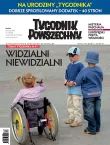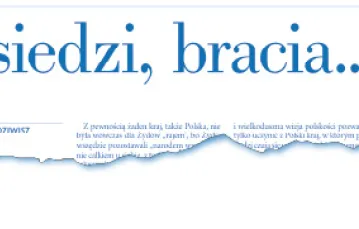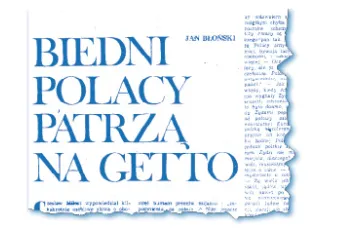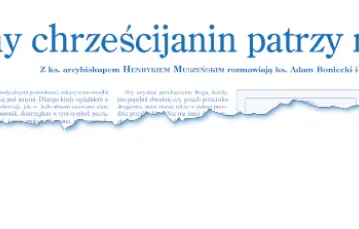Wykupienie dostępu pozwoli Ci czytać artykuły wysokiej jakości i wspierać niezależne dziennikarstwo w wymagających dla wydawców czasach. Rośnij z nami! Pełna oferta →
Władysław Bartoszewski’s text and the accompanying poem by Antoni Słonimski appeared in Tygodnik Powszechny No. 12/63. Over the next four years, the author, together with the editor and Polish philologist Zofia Lewinówna, compiled and edited respondents’ accounts of help given by Poles to Jews during the war, which were published by the Znak publishing house as Ten jest z ojczyzny mojej. The book had a huge impact; as Józef Czapski wrote in his review for the Kultura magazine, “it is our duty - the duty of every Pole and every Jew - not only to own this book, but also to read it from beginning to end and to disseminate it." The second edition, despite the difficulties caused by the anti-Semitic and anti-Israeli policies of the Communist state, appeared in 1969 and was expanded to include émigrés’ accounts.
He is my brother
This man, who his own fatherland forgets
When of the shedding of Czech blood he hears,
Who, as a brother feels for Yugoslavia,
Who in the pain of Norway’s people shares.
Who with the Jewish mother wrings his hands
In grief and bends with her above her slain.
Who Russian is, when Russia falls and bleeds,
And with Ukrainian weeps for the Ukraine.
This man, with heart to all compassionate,
French, when France suffers in captivity,
Greek, when Greeks in cold and hunger perish,
He is my brother - man. He is Humanity.
Antoni Słonimski 1943
Translated from the Polish by Frances Notley
Antoni Słonimski (1985-1976) was a poet, playwright, and journalist. In the inter-war years, he co-founded Skamander, a Polish group of experimental poets, and worked for the Wiadomości Literackie weekly. He spent the war years in Britain and France. Returning to Poland after the war, he became chairman of the Union of Polish Writers (1956-59) and was involved in many oppositionist activities, including the “Letter of the 34."
A symbol and leading-light of the liberal intelligentsia, towards the end of his life he helped it foster closer ties with the Church. From 1970 until his death, Słonimski was a columnist for Tygodnik Powszechny.
The issue of Polish-Jewish relations during the occupation is one of those historical problems that has given rise to many misunderstandings, particularly abroad. In recent years, we have witnessed certain unjust statements and publications in the West that have undoubtedly been conducive to the formation of completely mistaken opinions about the situation in Poland in 1939-44. At times, there has even been a tendency to charge Polish society with joint responsibility for the fate of Jews in Poland, a tendency which is in any case hardly new since it is found in Nazi propaganda. The well-known books of the American writer Leon Uris - Exodus and Miła 18, certain claims made in American, British, and West German periodicals, and even certain television programmes in the United States devoted to the essentially positive issue of those who helped Jews in occupied Europe, remain silent on the efforts of Poles in this regard, whilst reminding us that it was precisely in Poland where the extermination camps were located.
For sure, it would not be right to deny or overlook the suffering caused to Jews and to the Poles who helped them in occupied Poland by criminals who collaborated with the German police; criminals who caused much harm, and who were hunted down by patriotic underground organisations and denounced by public opinion. But those of us who experienced the horrors of the occupation for ourselves are aware of the many acts of kindness, support, friendship, and even sacrifice at the risk of death - in the name of the commandment to love thy neighbour or for noble reasons of human solidarity - that Jews encountered as they were rounded up and eventually condemned to death by the Nazis.
Some key facts should be recalled here:Polish society, itself subject to continuous mass terror (arrests, searches, executions, deportations to concentration camps) had no possibility of preventing the extermination of Jews shut away in ghettos and camps, just that it could not save the hundreds of thousands of Poles imprisoned in Auschwitz or Majdanek, shot on the streets of Polish cities, or executed at the Pawiak and Montelupich prisons or at Lublin Castle.
Poland was the only country in occupied Europe where the punishment for helping Jews in any way - accommodation, money, food - was death. This punishment was meted out consistently and ruthlessly; often entire Polish families, including women and children, were murdered.
At their own initiative, thousands of Poles in the towns and countryside - scholars and artists, doctors, teachers, priests, monks and nuns, voluntary workers, labourers and craftsmen, peasants and landowners - gave direct assistance to the persecuted and helped them to survive. In addition to this were numerous - albeit unrecorded - acts of true sacrifice, great kindness, and dedication to one’s fellow human beings.
To date, there have been no serious historical studies done on cooperation between Poles and Jews in the underground. Many of those who helped the victims, or who received help themselves, did not survive the war or died shortly thereafter; those who did survive do not always wish to delve into their tragic past. Finally, many of those who helped the victims did so out of a plain sense of duty; modesty prevents them from speaking out on this issue.
There have been many appeals to the readers of Tygodnik Powszechny to send in their answers to questionnaires or to participate in competitions connected with various social, moral and cultural problems. Such appeals have often met with an extremely good response. I believe that regarding a matter as important and vital as cooperation between Poles and Jews during the occupation, we have a moral duty to bear witness as comprehensively as we can. Not just in order to counter false judgements based on ignorance or bad faith, but above all for historical and educational reasons: in order to record for posterity the extraordinary stance of people characterised by a genuine humanism - absolute respect for human life and dignity, regardless of race, beliefs, faith or nationality.
This year, in which not only Poland, but also the United States, Israel and many other countries will commemorate the twentieth anniversary of the tragic and heroic armed resistance of Jews in the Warsaw (April-May 1943) and Białystok (August 1943) ghettos, and which also marks the twentieth anniversary of the final extermination of large Jewish communities in Kraków, Lublin, Radom, Częstochowa, and other Polish cities, seems an especially appropriate moment to ask the participants and witnesses of those events to reach into their memory and recollect everything that has not yet been erased by the passage of time.
I would like, therefore, to make a heartfelt appeal to the readers and friends of Tygodnik Powszechny at home and abroad, as well as to all people of good faith who could help in this matter, Christians and non-Christians alike, to send in their personal recollections as well as stories and information about other people’s experiences (provided these accounts are reliable and genuine) relating to the help given by Poles to Jews during the Nazi occupation of Poland. What is important and valuable are specific examples, simple descriptions of events and facts, supported where possible by dates and places and the names of those who provided the help, as well as those who received it, or the names of witnesses, and copies of any relevant documents and photographs.
Władysław Bartoszewski (born 1922) is a historian, politician, and journalist. An inmate of Auschwitz, he was released thanks to the efforts of the Red Cross. He worked at the Propaganda and Information Office of the Home Army’s High Command and was active in “Żegota," the Polish Council to Aid Jews, which operated under the auspices of the Polish Government-in-Exile through the Government Delegation for Poland. During the Stalinist years, Bartoszewski was a political prisoner. A contributor to Tygodnik Powszechny from 1957, he was a member of its editorial board until 2007. In 1966, he was awarded the Righteous Among Nations medal (three years earlier he received a similar medal on behalf of “Żegota"). He was twice Minister of Foreign Affairs during the Third Republic.







